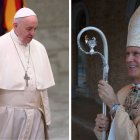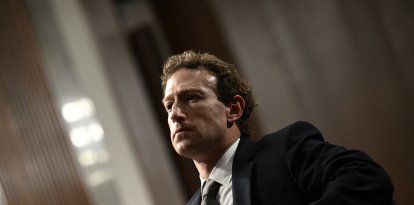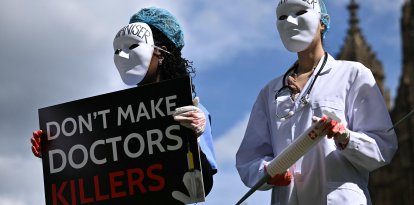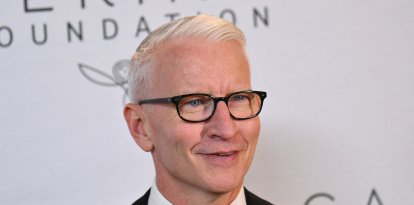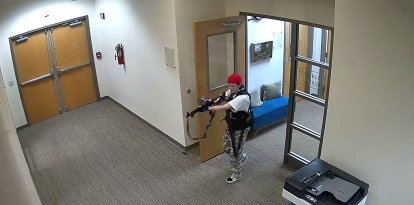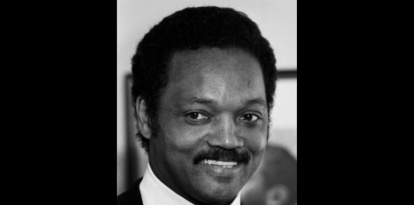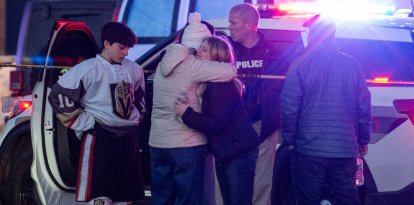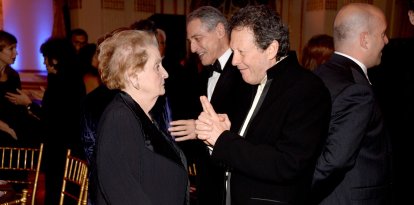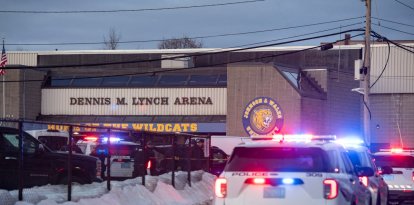OBITUARY
Francis, the pope of the periphery
The first Jesuit and non-European pope was characterized by increasing the role of women and by bringing the Catholic Church closer to the marginalized, the poor and immigrants, while his nods to the woke agenda led several bishops to call him a "heretic."
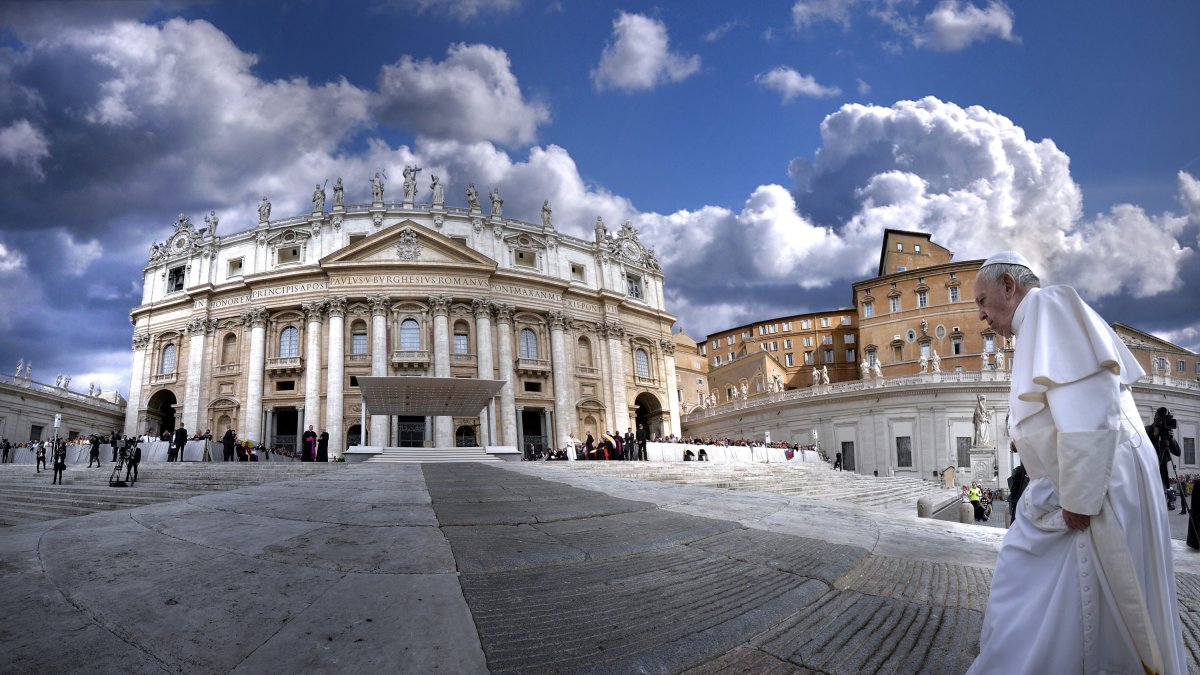
Pope Francis walks in St. Peter's Square.
Pope Francisco (Buenos Aires, 1936 - The Vatican, 2025) went down in history as the first pope "of the periphery," as he liked to say. In fact, the concept of "the peripheries" in all areas of life was a constant, one of the great keys of Jorge Bergoglio's papacy: putting the poor, the immigrants, the weak, the suffering, at the center. However, his papacy was also marked by flirtation with the woke agenda, with nods to the LGBT lobby and the fight against climate change, as well as a major purge of conservative bishops and cardinals in recent years.
His arrival came amid stupor around the world, since he became the first pope since the Middle Ages to accede to the chair of St. Peter's with his predecessor alive, as well as being the first Jesuit to hold the papacy. The resignation of Benedict XVI, unable to carry out the necessary reform of the curia, marked a milestone in the history of the Catholic Church. Francis was proclaimed on March 13, 2013, with Ratzinger's pending mission as one of his priorities, in addition to breathing new life into the institution.
A papacy that began in 2013 with a handwritten speech
Even before being elected by the cardinals in the conclave, Bergoglio read a handwritten speech in which he exposed his idea of the needs of the church and of the pope today. Through four points, which would later be made public by the now deceased bishop of Havana Jaime Ortega, the future pope laid out the need to reach all the peripheries, including "geographical" and "existential" ones, and made an appeal to abandon self-contemplation:
"1. The Church is called to go out of itself and go to the peripheries, not only the geographical ones, but also the existential peripheries: those of the mystery of sin, those of pain, those of injustice, those of ignorance and religious dispensation, those of thought, those of all misery.
2. When the Church does not go out of itself to evangelize, she becomes self-referential and then she becomes sick. The evils that, over time, occur in ecclesial institutions have their roots in self-referentiality, a kind of theological narcissism. In the Apocalypse Jesus says that he is at the door and knocks... But I think of the times when Jesus knocks from within so that we let him out. The self-referential Church pretends Jesus Christ inside and won't let him out.
3. The Church, when it is self-referential, without realizing it, believes that it has its own light; it ceases to be the 'mysterium lunae' and gives rise to that very serious evil which is spiritual worldliness ... That living to give glory to one another. To simplify; there are two images of the Church: the evangelizing Church that goes out of itself; the 'Dei Verbum religiose audiens et fidenter proclamans,' or the worldly Church that lives in itself, of itself, for itself".
'A poor church for the poor': St. Francis of Assisi, Bergoglio's model
The fourth paragraph of the missive focused on the figure of the pope, of what today's Church needed to fulfill its mission. For Bergoglio, the only cardinal who came to compete in number of votes with Ratzinger after the death of John Paul II, the next Pope should be:
"A man who, from the contemplation of Jesus Christ and from the adoration of Jesus Christ will help the Church to go outside of itself to the existential peripheries, who will help it to be the fruitful mother who lives from 'the sweet and comforting joy of evangelization.'"
Through these four points one can understand the course of the church during the decade that Francis has been at the helm. The choice of his name, in honor of St. Francis of Assisi, also insisted on this line, in the face of his idea of "A poor church for the poor": "For me it is the man of poverty, the man of peace, the man who loves and guards Creation," he noted.
Reform of the curia
Francis' papacy has been full of reforms, many of which directly affect the curia, the mission for which the purpurates elected him. Thus, he was quick to create the Council of Cardinals, made up of himself and eight purpurates, in order to address the necessary reforms within the Roman Curia and revise the Apostolic Constitution Pastor Bonus.
In 2022 he would publish the Apostolic Constitution Praedicate evangelium, culminating this process of transformation of the Roman Curia. Among the main changes was the opening of the possibility that a layman or woman could head a dicastery, in addition to reducing the number of dicasteries and placing them at the service of all the dioceses and not only of the papacy. In addition, this document has a special emphasis on the protection of minors.
Against 'throwaway culture' and in defense of immigrants
Outside the struggle to open the windows of the Vatican, Francis' priority has been to combat what he called "throwaway culture." The pope condemned the "dehumanization" that society makes of the poor, especially immigrants, as well as the weak, the persecuted, the elderly and children. His fight against child abuse in the church was relentless and caused friction in a broad sector. His fight has included the LGBT community, which he has acknowledged on several occasions.
Undoubtedly, immigrants have been one of Francis' main focuses. It was not unintentional that the pope choose Lampedusa as the destination of his first apostolic journey. There, after laying a wreath of flowers in the Mediterranean, in honor of the thousands of dead trying to reach the shores of Europe, the pope launched a cry against "the silent massacres before which we still remain powerless and stunned."
"The death of innocent people, mainly children, in search of a more peaceful existence, far from wars and violence, is a painful and deafening cry that cannot leave us indifferent. What is happening in the Mediterranean, which is reflected in Lampedusa, is the shame of a society that no longer knows how to mourn and pity the other."
Clash with the Trump administration over immigration
His defense of immigrants led him to confront the Trump administration over its policy of mass deportations and closing the borders to illegal migrants. In a letter to American bishops, Francis stressed that God "invites us to look at the reality of our time, so clearly marked by the phenomenon of migration, as a decisive moment in history to reaffirm not only our faith in a God who is always close, incarnate, migrant and refugee, but the infinite and transcendent dignity of every human person."
Furthermore, the pope pointed out that Jesus himself "did not live apart from the difficult experience of being expelled from his own land because of an imminent risk to his life, and from the experience of having to take refuge in a society and a culture foreign to his own. The Son of God, in becoming man, also chose to live the drama of immigration."
More than a decade of 'tension'
On the occasion of his tenth anniversary at St. Peter's, Francis summarized his papacy as one marked by "tension." And so it was, with an ever-busy agenda. The pope has made 47 apostolic visits and traveled to 66 countries on five continents. In addition, he has published four encyclicals ("Lumen Fidei" in 2013, "Laudato Si" in 2015, "Fratelli Tutti" in 2020 and "Dilexit Nos in 2024), as well as seven apostolic exhortations, and he canonized 899 saints, including three popes (John XXIII, John Paul II and Paul VI).
For the pope, the synodality of the church is another key point. He promoted the Synod on Synodality in which he challenged Christians around the world on critical issues of the institution, and which had its culmination with the meeting of the bishops in 2024. During his papacy, the Synod on the Family and the Synod on Amazonia were also held.
The role of women in the church and the defense of 'sister Earth'
Francis also opened the debate on the possibility of ordinating priests to married men or the role of women in the Church, even considering the female diaconate. For the moment, he has placed the nun Simona Brambilla as prefect of the Dicastery for Institutes of Consecrated Life and Apostolic Societies, the first woman at the head of one of the Vatican ministries. In addition, as of March 1, Franciscan Raffaella Petrini will become the first female governor of the Vatican City.
Care for "sister Earth" is also a pillar in Francis' theology. The pope introduced "ecological sins" into the catechism. They are an "action or omission against God, the community and the environment. It is a sin against future generations and is manifested in acts and habits of pollution and destruction of the harmony of the environment." Likewise, the pope has been very active in public messages promoting the fight against climate change and even participating in Climate Summits remotely and considering attending in person on occasion.
Francis' great pain is war, especially those in Ukraine and Gaza. The pope has repeatedly called for peace in both conflicts and even considers the Russian invasion as one of his great failures.
Controversies and 'purge' of conservative bishops
However his papacy was also full of controversy, especially for some of the pope's moves that flirt with the woke agenda and that led several prelates to publicly oppose him, even calling him a "heretic," such as the former bishop of Tyler, Texas, Joseph Strickland.
The pope has not stood idly by in the face of the rebels. In addition to accepting the age-based resignations of many of the critics (they must submit it, according to canon law at age 75, and the pope can leave them in place until they are 80), in recent years, he has gone a step further and demanded the "voluntary" departure of several of them, such as that of Strickland himself in 2024 or that of the French bishop of Fréjus-Toulon this year. He also signed the excommunication of the former nuncio to the U.S., Carlo Maria Viganò, for not recognizing the authority of the pope and accusing him of having "a tyrannical management of power."
The pope of the image
Francis stood out as a prodigy in communication. His ability to launch forceful messages that resonate was a constant during his papacy. Aware of the importance of image, many of his gestures have been engraved in the retina of millions of people, both believers and non-believers.
The garland of flowers in Lampedusa, his embrace of a sick person who looked repulsive because of his illness and the repeated occasions on which he has washed the feet of prisoners are all examples of this. His solitary prayer in St. Peter's Square in the midst of the COVID-19 pandemic, broadcast live around the world is another of his great milestones.
A College of Cardinals in keeping with his idea of the church
The appointment of cardinals during his papacy was aimed at reinforcing the continuity of his idea of church. At present, two-thirds of the cardinals who will elect his successor were named by him. This does not mean that they are ideologically in tune with Francis, but it does mean that he perceives a certain affinity with them on key issues to have chosen them.






